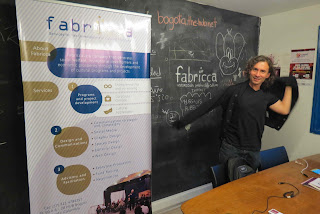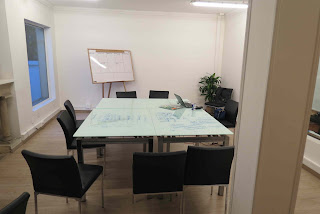 |
| Camilo Russi and Diego Rodriguez in front of the Hub Bogotá. |
 Networking, collaboration and alliances seem to have become key elements for all progressive causes - and those are the ingredients which The Hub - a kind of leftist beehive in Bogotá's Zona G - tries to harness and promote.
Networking, collaboration and alliances seem to have become key elements for all progressive causes - and those are the ingredients which The Hub - a kind of leftist beehive in Bogotá's Zona G - tries to harness and promote. |
| Carlos Barrero of fabricca, a cultural promoter. |
 |
| One of The Hub's many meeting rooms. |

The Hub's members include large organizations, such as Bamboo Finance, which says it manages $250 million dollars in investment funds for progressive causes and has offices on four continents, and LGT Venture Philanthropy, which says it works on six continents. But most seem be small local organizations, such as fabricca, a three-year-old promoter of cultural activities which was one of The Hub's first members - but which I couldn't even find with Google.
 |
| The Hub, Bogotá. |
"It's a space for sharing," Carlos Barrero, one of fabricca's founders, said of The Hub, "combining social, environmental and cultural projects."
Near fabricca we walked past Mono Films and a recycling organization called Cempre. On the first floor are the Green Pages and in a small upper floor office is Acumen, an anti-poverty organization.
Despite its philanthropical philosophy, The Hub's members include for-profit organizations with a
conscience and The Hub itself is intended to turn a profit on its services. But The Hub doesn't appear to have concrete guidelines for which organizations it accepts as members. I asked Hub employee Diego Rodriguez, who guided me around, how they'd respond if, say, a casino, a tobacco company or some other profit-only driven business asked to join.
"We'd try to change their thinking," Rodriguez explained, adding that such businesses usually realize that The Hub's not for them.
 I was surprised - and a bit disappointed - by a few aspects of The Hub. Its entry hall contained the usual pamphlets about promoting culture, recycling and bicycling - but their parking lot was filled with cars, and their small bike rack was empty. I also asked why they're located in the exclusive, high-estrato Zona G, near five star hotels and gourmet restaurants. Rodriguez explained that one of The Hub's goals is to show that 'you don't have to make great sacrifices in order to do development work.' True enough. But La Candelaria and southern Teusaquillo aren't slums, and cheaper offices there could free up money for doing more good. And I can imagine that the Zona G's ritzy atmosphere could intimidate some of the low-income people the Hub aims to help.
I was surprised - and a bit disappointed - by a few aspects of The Hub. Its entry hall contained the usual pamphlets about promoting culture, recycling and bicycling - but their parking lot was filled with cars, and their small bike rack was empty. I also asked why they're located in the exclusive, high-estrato Zona G, near five star hotels and gourmet restaurants. Rodriguez explained that one of The Hub's goals is to show that 'you don't have to make great sacrifices in order to do development work.' True enough. But La Candelaria and southern Teusaquillo aren't slums, and cheaper offices there could free up money for doing more good. And I can imagine that the Zona G's ritzy atmosphere could intimidate some of the low-income people the Hub aims to help. |
| One of The Hub's shared workspaces. |
That said, The Hub's a healthy initiative for Bogotá, a city in dire need of more activism, particularly of the grassroots variety. If The Hub, by creating alliances and networks amongst differing organizations, can promote that, it'll make a real contribution to this city.
By Mike Ceaser, of Bogotá Bike Tours





No comments:
Post a Comment